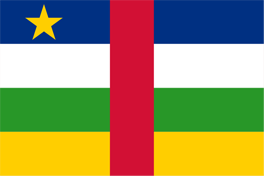 |
République centrafricaineIndependence 13 August 1960
History This is one of the rare colonial territories whose name, invented in the independence era of pan-African aspirations, hasn't changed. French colonizers call this territory 'Oubangui-Chari', as diverse in its geography as in its population, and yet so poorly known at the time that 19th century geographers invent all kinds of infamously fantastic descriptions. While eastern regions live under 'Sultanates', the rest of the territory is organized into lineage and village societies. More important, the country suffers two slave trades: first the centuries-long European transatlantic trade, which explains the presence of 'Central African' names in Central and South America; then the trans-Saharan trade in the second half of the 19th century, whose impact remains controversial. Its position as a crossroads also explains the fierce competition between Germans, Belgians, British and French. Established in 1888, the territory becomes a French colony in 1903, then becomes integrated into the AEF (French Equatorial Africa) in 1910. The years between 1890 and 1940 are the colony's most dramatic, its hands tied by 'concessionary companies' exercising kingly rights, and by the labour drain caused by the building of the CFCO (Congo-Ocean Railway), which results in maltreatment witnessed in the 1920s and 1930s by André Gide, Marcel Homet and Albert Londres. Conversely, the Second World War appears to be the colony's hour of glory, as it stands shoulder to shoulder with General de Gaulle and unoccupied France. While the independence process generally conforms to French decolonization, it becomes known for delays caused by reactionary colonists, flagrant racism, and the virtual absence of modern economic and social infrastructure. Barthélemy Boganda, a former priest, channels popular energy and hope with MESAN (Mouvement d'évolution de l'Afrique noire) and its ambitious economic programme based on peasant cooperatives. This pan-African party hopes to create in the heart of Africa the 'United States of Latin Africa', whose core would be a 'Central African Republic' encompassing AEF territories. But the project fails owing to territorial nationalism and secret French efforts to undermine it. Loathed by colonists, Boganda dies in a well-timed plane 'accident' whose cause remains unknown to this day. His tragic death weighs heavily on what CAR has become, betrayed by the insatiable appetites of its former colonial overseer, party and military antagonisms, and the instability of inherited colonial borders. Elikia M'Bokolo (EHESS / UNIKIN) |


